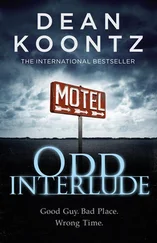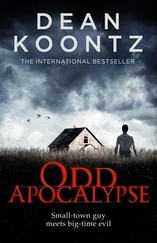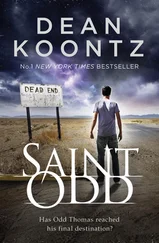Utgard Rolf-dressed in black nylon pants with elastic cuffs tight at the ankles and a matching jacket-and a man I had not seen before were conferring near the small crane.
Two other men were at work on the port side, stowing tools in a secured deck box.
Pulling pistols as they moved, Utgard and the man to whom he had been talking, no doubt Buddy, crossed the deck behind the other two men and shot them in the back. Both sprawled facedown, and their executioners bent to administer a final shot to each at the base of the skull.
HESITATING BEHIND THE COMPANIONWAY DOOR, I thought that they would weight the dead men with chains before tossing them overboard.
Evidently, they were confident that from this distance the sea would not bring the bodies to shore for days-if ever-and that by then they would have vanished into their new lives in far corners of the world. They put away their guns, grabbed the cadavers by collars and belts, and began to drag them toward the portside deck wall.
Their backs were to me, but they would remain vulnerable only briefly. Bull strong, Utgard did not long drag his victim, but soon lifted him clear of the deck and carried him.
I dared not think about what was required of me here, but had to focus my mind on why I must not fail to act: the possibility of children seared to the bone by blast heat, of women crushed and torn by the detonation wave, of men atomized, buildings hammered to dust, museums in rubble, churches obliterated, blacktop streets boiling like rivers of lava, and square miles of ashes soaked with the blood of millions.
With no awareness of having pushed through the stairhead door, I found myself on the open deck, in motion.
The immediate fog was silver with halogen reflections, white overhead, and gray beyond the limits of the boat, the yacht lights already having been swallowed as completely as Jonah and his lantern.
The chill wet air on my face was not as cold as the pit of my stomach, and the plume of my breath across my lips seemed cold as well.
With his burden, Utgard reached the port wall. He heaved the body overboard, but the dead man’s feet hooked on the gunwale. For a macabre moment, he hung that way, until Utgard gave him a final push into the sea.
Fearing a fall, I nonetheless negotiated the wet and gently rolling deck as though born on a ship. In a two-hand grip, I brought the gun to bear.
The other man wrestled the second corpse halfway over the gunwale. Utgard grabbed one of the cadaver’s arms to assist.
Seeing the difficulty of this disposal, I waited for them to finish the job.
A hero does not shoot his adversaries in the back. But hero is a title others have wrongly given to me, which I have never claimed for myself.
As the second corpse vanished into the night and fog, I shot Utgard twice in the back from a distance of less than eight feet. He fell forward against the gunwale, but did not tumble overboard.
The other man recoiled in shock but in the same instant went for the weapon in the paddle holster at his hip.
I squeezed off two rounds, trying for abdomen and chest, but I allowed the pistol to pull too high. The first round took him in the face, and the second only parted his hair.
The head shot was enough, and he went down dead.
In bad shape, supporting himself against the gunwale, Utgard turned toward me. Filled with halogen reflections, his demented coyote eyes were lanterns burning unholy oil.
His face was bruised, one eye swollen half shut, one ear crusted with blood-the consequence of events in the interrogation room.
As I stepped closer, he reached, and I shot him twice again.
He slid down the gunwale and toppled onto his side. His head knocked the deck hard enough to bounce.
For a while I took great deep breaths and blew them out, trying to exhale the tension that had suddenly begun to make my hands shake like those of a palsied old man.
Having watched them wrestle the corpses overboard, I changed my mind about eliminating these two in the same way. Disposing of them would make no sense if I left Joey dead in the radio room, and I did not believe that I could also manage to drag him topside for burial at sea.
A way might present itself in which I could get the tugboat and the nukes into the hands of responsible authorities without making the delivery personally. If I remained anonymous, never coming face to face with them, I would not have to explain the killing that I had done.
I turned my back on the dead and crossed the deck toward the coffinlike crates that were stored on the starboard quarter.
Movies condition us to expect that a villain shot repeatedly, appearing to be dead, will reliably rise once more at the penultimate moment, with shrieking violins as background. But reality has no symphonic soundtrack, and the dead stay dead. Only the spirit rises.
I was alone aboard the tugboat, and I doubted that the collector holding the contract on Utgard’s spirit would allow him to linger as a poltergeist.
With killing on my mind, I had crossed the deck in surefooted haste, but with the killing done, my balance seemed more precarious. As I moved and as my feet tripped on obstacles that did not exist, I reached out to grab supports that were not at hand.
A vastness of fog above and all around, an immensity of sea to every quarter of the compass, and a watery abyss below imposed upon me a loneliness almost unbearable because of its intensity and also because of what shared the boat with me. I mean the dead men, yes, but not only the dead; I mean primarily the bombs, four cities’ worth of death condensed and packed into containers that were symbolic urns full of the ashes of all humanity.
The crates transshipped from Junie’s Moonbeam were built not of plyboard but of steel. The hinged lids were held down by four evenly spaced bolt latches.
I slid open the four bolts on the first crate. After a brief hesitation, I lifted the lid.
The halogen light reached far enough to show me two compartments with a large device in each. They appeared to be of cast and machined steel, of formidable weight, bending the light seductively, liquidly, at every curve, each mysterious detail and each fitting ominous in design. In its entirety, the thing was not merely a weapon, but the quintessence of evil.
The crate had been welded together around an armature that kept the bomb immobile. Special tools would have been needed to free it from the shipping case.
At what might have been the core of each device, a four-inch-diameter hole appeared to have been crafted to receive a mated plug.
I stared at the hole for a while before realizing that also bolted to the armature was a box separate from the bomb. This had a hinged lid held shut by a single bolt.
Inside I discovered a double-walled felt bag that filled the space. I lifted out the bag and found within it the plug to match the hole, which weighed four or five pounds.
From the look of it, I guessed that once inserted into the core, it would lock in place with a twist. One end featured an LED readout currently blank and a keypad for data input.
The trigger.
Returning the plug to the soft bag, I put it on the deck. I collected the other three.
After closing the two crates, I carried all four detonators, in their sacks, up the open stairs to the foredeck, which consisted of a narrow walkway around a central structure. I went through a door into a compartment that served as a combination dining space and lounge.
In a closet, I found rain slickers and other foul-weather gear, as well as a well-worn leather satchel, which was empty.
All four triggers snugged in the satchel without distorting it. I was able to close the zipper.
As I pulled the zipper shut, the hand holding the bag and the hand gripping the tab looked like the hands of a stranger, as if I had just awakened in a body that was not mine.
Читать дальше
Конец ознакомительного отрывка
Купить книгу


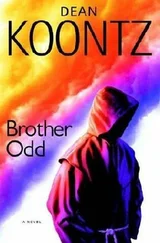
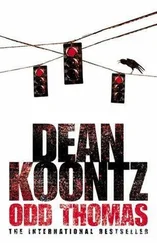



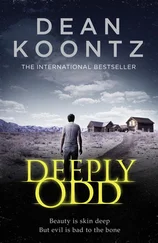
![Dean Koontz - You Are Destined To Be Together Forever [an Odd Thomas short story]](/books/705298/dean-koontz-you-are-destined-to-be-together-foreve-thumb.webp)

